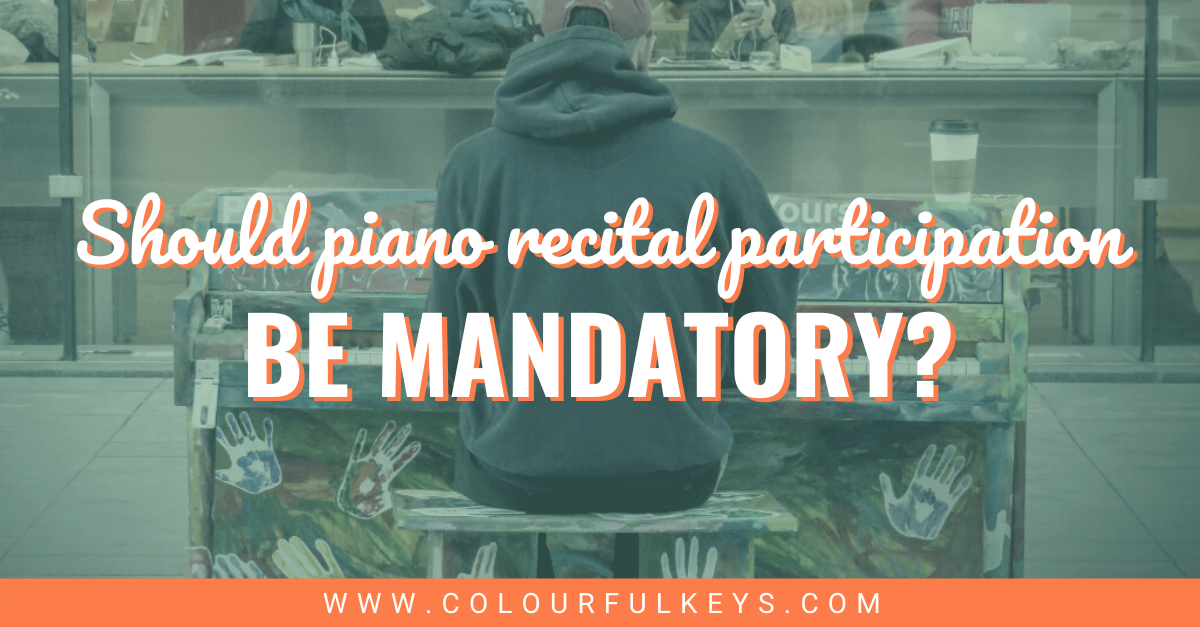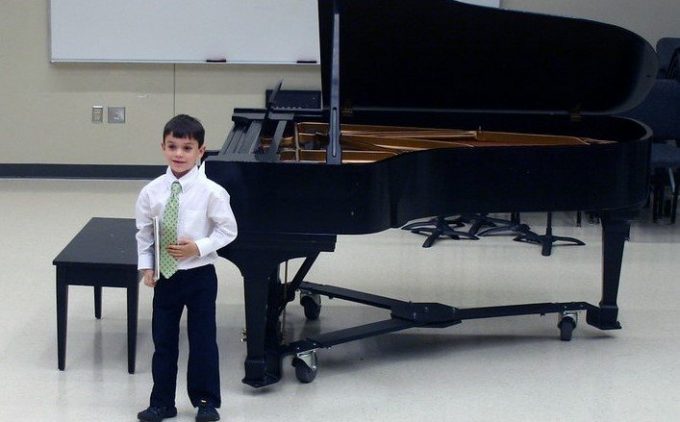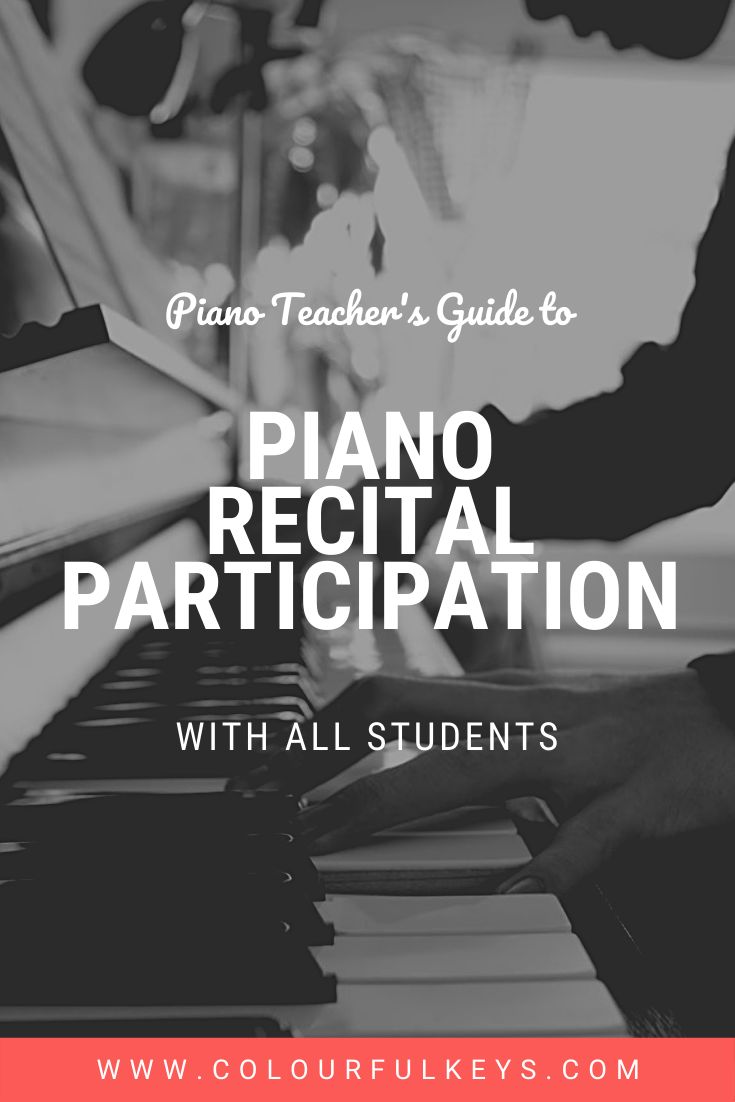Performing for others is a valuable part of the music lesson experience. It teaches us performance skills which we can apply to other areas such as public speaking, acting and debates, and it builds our confidence in our playing. Plus it gives us an opportunity to pat ourselves on the back and acknowledge what we’ve achieved.
So, with that in mind, should we require piano recital participation in our studios?

Nope. End of post. 😜
Just kidding, of course. But I’m not going to lie to you, I am biased in this area. If you’re looking for a balanced view you should probably look elsewhere. Nevertheless, let me explain my reasoning for so strongly opposing the idea of a recital requirement.
Pros(ish) of a Recital Participation Requirement
Better Participation Rates
Well, this is the obvious one. If we require piano recital participation from our students we should get higher rates of participation. Shouldn’t we? 🤔
Maybe. But, really? If a family isn’t free on the recital date then I don’t understand how you can actually enforce their attendance. If it’s Aunt Margaret’s 100th birthday then you’re going to have to either move the recital date (risking a clash with something that’s important to another studio family) or just accept that they can’t come and break your policy.

Maintaining High Standards
In some studios, recitals are a point of pride. Teachers insist on a high-performance standard and polish for each concert and this is a big part of what makes their studio special. I get that, I really do.
I also understand how requiring recital participation, therefore, might seem appealing, because it could discourage those who aren’t serious about their studies from staying in/joining your studio. I think it’s great that you want your studio to stand for something.
But I don’t think a requirement is the way to do that. An expectation, perhaps, but not a rule. We want our students to want to play in our recitals (see the second con below) and to be excited to meet your expectations of performance standards.
Cons of a Requiring Recital Participation

Too Black and White
To me, putting anything like recitals or practice in your policies just doesn’t sit well. These things are not all-or-nothing, black-and-white issues. They are not like payment policies (either you pay on time or you don’t) or punctuality (either you’re on time or you’re late.) They are nuanced and depend on so many factors.
I’m not saying that teachers who have recitals participation in their policies are not going to show some grace with a student who has anxiety issues…but why put things in your policies in the first place if they’re subject to so many variables?
Sends the Wrong Message
One of my favourite books I’ve read in the last few years is called Punished by Rewards and, to me, the idea of a recital requirement policy smacks of some of the lessons from that book. When we require recitals, or even give presents and prizes for recital participation, we’re telling our students that this is something yucky. We’re showing them that we believe they need a bribe or a rule in order to participate in a studio concert.
Is that the right lesson to send?
Surely not! Recitals are the reward. Playing for others and sharing the music we’ve learnt with them should be a joy, not a chore.
Do you have a piano performance requirement in your policies?
Has this article swayed you at all, or are you sticking like a Medjool date? Let me know what you think about the idea of recital requirements in the comments below or in our Facebook group.

Nicola,
I love reading your posts and get so many great ideas from you! Thank you for pouring your heart into your students as well as other teachers.
However, I must respectfully disagree with you on this one. Many of my students play sports or are at least familiar with the concept of “playing the game.” I tell my students that recitals and other performances are “playing the game” for music. You would never go to soccer practice all season and never play in the game. Music is meant to be shared, not kept to ourselves. We practice so we can play the game and share our music with others.
Recitals also create community. My lessons are individual lessons, not groups, so recitals and performances are the only chances students have to cheer each other on and see progress from the previous recital. They’re inspired and motivated by each other.
My students understand my expectations and look forward to each recital. The only allowance I give for students not participating in recitals is another conflict that they can’t get out of.
As far as rewards for participation, I give certificates. Again, with the sports analogy, students receive trophies and recognition for their participation on the team, so I don’t see it as a bribe or “yucky.” The spring recital is also recognition for accomplishments throughout the year, such as 30-piece challenge, practice competition, etc. It’s a BIG night and a much anticipated event!
Thanks again for all you do to help us teachers! You’re very appreciated. 🙂
I agree!
Interesting perspective Dana! I think we disagree in the ultimate purpose of learning music. I don’t think that performing it for others is, or has to be, the end game of learning music. You can learn it just to learn it, or to play it for yourself.
I understand your way of thinking about it, though and I’m sure many will agree with you so thank you for sharing.
I agree with you, Nicola. I don’t believe in forcing a student to do anything they really don’t want to do. Some children have greater fears and we don’t always know why. They may not want to take lessons at all if they are forced to be in recitals. And playing for your own enjoyment is a wonderful thing.
I agree with everything Dana said above. I wanted to mention that all of my recitals are optional except one, my spring recital. This one is a BIG deal as it’s our celebration recital where our theme and goals for the year comes to a close. Students and parents all look forward to it.
This is also when they earn any awards from goals they worked on all year. My students do not get recital participation awards. The awards they receive our based on their own merit and effort they made throughout the year. We have specific goals and accomplishments they are working on. The recital is the big finale.
Now if there is a family that has a special circumstance like I have one this year where her sister is graduating the same day from college, they get a pass. Otherwise a conflict like a soccer game is not going to do it. Are they bummed about having to miss? Yes! But do they expect me to move the date? Of course not.
I do understand where you are coming from though which is the reason all my others are optional.
One last thing I wanted to mention is sometimes families don’t understand the importance of something until they experience it first hand. If given a choice when it’s their first time and never experiencing it yet, they probably won’t see it as a big deal to miss. They simply don’t know what they are missing. However if the expectation is there that their child needs to participate, once they experience it they don’t ever question it again because they GET it. 🙂
Jennifer,
Yes, thank you for pointing out that they don’t know what they’re missing until they experience it. I completely agree. Of course, I occasionally have new students who aren’t thrilled about performing in front of everyone, but I’ve only had one student (a teen) who said she only wanted to take lessons and not perform in the recitals. I told her that wasn’t an option. She’s never mentioned it again since her first recital!
I do give a certificate of participation to every student, but like you, all the rewards I give at the spring recital are earned throughout the year.
Hmm, that’s good to know Jennifer, thank you. You see, my students would never miss it without a good reason and I don’t think any would undervalue the experience either, especially for their first one! Most of the students who can’t participate tends to because of a clash with a family event and I understand them putting that first.
In addition to the benefits listed above of recital participation, performance in recitals also gives our students the opportunity to learn to simply give the gift of their music to others. It’s more than just making them be better performers. It helps them be more thoughtful and generous people.
I agree that recital participation should not be mandatory. Neither are piano lessons. But piano teachers can do a lot to making piano performances be so attractive and desirable that students would not want to miss them
I agree with you Nicola.
I have end of term concerts 4 times a year – I’ve never made them mandatory but my students just expect that they’ll be playing and parents and students seem to look forward to them. I endeavour to make my concerts fairly informal and thus less intimidating. I don’t give out rewards or certificates at the concert: it’s just about the joy of sharing music. My formula for enjoyable concerts is keep them frequent and just an hour long with around 10 students who play 2 – 4 items each, including some duets with me or another student. Often I get 100% attendance but inevitably people sometimes have other things on and I don’t make a big deal of that.
I totally agree with you Nicola. I encourage students to participate but it is never mandatory. Some students, particularly new students, are truly terrified about playing in front of others and it doesn’t feel right to force them. I invite them to still attend the recital so they can be part of it and see how much fun the recitals actually are! I try to make recitals all about the joy of music, and always include some sort of audience participation so everyone is involved. Ironically, I’ve never had anyone say after they attend a recital that they won’t play at the next one.
I recently this year came to the same conclusion as you Nicola.
Recital participation this year is optional ( you can even attend recital and play a private family concert as a option). I no longer wanted to have children/performers afraid to play or cry in distress/anxiety. Throughout the year students can can choose to play at GIG’s at restaurants or nursing homes . Performing in front of an audience is one aspect to learning; if it creates anxiety don’t do it. Play music for yourself or your family at home- do what brings you joy.
I know this fits me and my studio’s set-up ( Shocker alert-I close the studio in the summer and am proud to be a company of one-not looking to hire or expand).
Do what makes you happy-it may not be the norm; others may disagree; but if it works for you, your students & families then go for it!!!
Examine why you do things and always stay authentic to yourself; be willing to learn and look at all sides and options in your life and business.
Recitals are optional but most of the students participate except some of my adult students don’t. Although last recital, the youngest was 5 and the oldest was 72! It actually inspired some mothers to learn. It’s never too late!
I do give out Certificates of Achievement for successful performance in the recital, not as a reward, but more like a milestone.
i hold a series of events at various levels of ‘scariness’ throughout the year, and always ‘if you would like to play, OR listen to others’ I believe it is important to play, but appreciate how quickly that can kill the nervous pupil too. SO I offer the chance to listen to others and offer specific thoughts about the music they heard and technical pr performing skills they noticed and admired. This then becomes an inspiration for them to work towards. Some of my events are: a ‘musicmash’ on a weekend afternoon, for those at a similar level and also includes group and team games, duets, sight reading, improvisation.
An open-lesson where they may invite up to 6( friends or family( thats all I have space for!) to listen in
A garden-party-where the music played is as ‘wallpaper’ in the background, just whenever the player might be ready, and the windows and french doors are all open for wanderers (although families usually sit in and video of course,
an adult soiree or cocktail party at which i also play, and we all laugh heaps.
A pre-exam peer-pre-assess session
and a regular formal recital for those who enjoy, but usually only do this every second year as I run out of time!
I also take groups to any and every concert/musical theatre/ballet that so appropriate in town, so the concept of performing art is a main part of our studio culture.
It’s great that there are different points of view for this because there really are so many different types of students out there. I seems that not every student wants to be a solo performer (ex: me…I thrive playing in groups like jazz band, worship team etc..). I never saw the value in recitals when I was a kid, but I do now. I currently have 10 students and it’s amazing how each one of them has a very different fear level regarding performing. Instead of a recital (which none of the teens wanted to attend) I recently held my first student-only “music hour” gathering for the teens (13-18 years). Five out of seven teens came and they played 2 songs each, and we played a couple of games and had snacks. One unexpected insight I got from a student who came said, “I’m so glad I came, I didn’t know you taught other teenagers, I thought it was just little kids.” Another student said, “I never want to do this again.” LOL!
This is an important discussion for music teachers and great to hear different ideas and suggestions on this important topic. For my students, Concert participation is strongly encouraged but never compulsory. I regularly provide my piano students with certificates of achievement for playing at Concerts and at chartible events. Every student who plays at my Concerts receives a Cert. at the very end. It’s not in any way to be miscontrued as a bribe, but rather, these certs. can be used for their resumé (C.V) or portfolio that can be used for later in life e.g when applying to college or a job. Certificate of achievement reaffirms their good work and is especially relevant for students who are not completing graded exams. Each Cert. contains their full name, date of Concert and the name of the piece performed. I always laminate the certs. and sometimes add 3D butterflies to make them child friendly depending on the age of the student. It’s a symbol that is no time, they’ll become butterflies at playing the piano. At our Christmas Concert, I provide students with a small Xmas gift in the form of a chocolate snowman (less than €5 in Aldi). Again it’s not a bride but a small way of wishing them a happy Xmas. Sometimes when we are kind as Teachers we can be accused of ulterior motives. My advice is: be kind any way. I hold two Concert per year: one at Xmas, the other is a summer concert at the end of May. I put together two Newsletters, one after Xmas, the other after our May Concert. Both contain a photo gallery and a Concert review with a number of activities in the back pages. I also put together Concert Programmes with photos of each student with a bio attached and the name of their piano pieces. I also ask parents to help me organise food for our Concerts and I’m always thankful that each parent makes a contribution. Parents are delighted to be involved in helping to make the Concerts special.